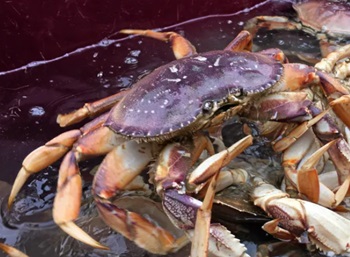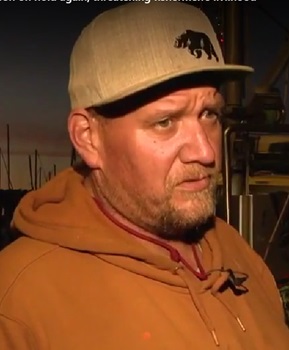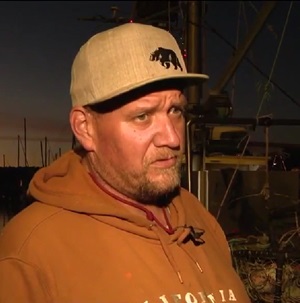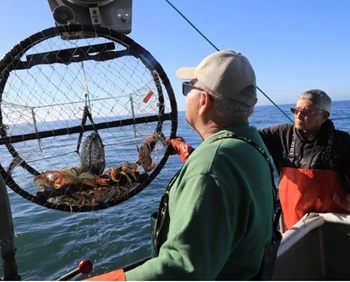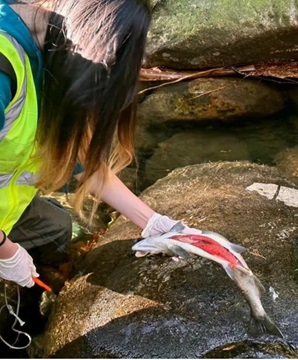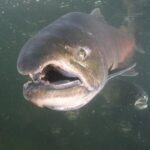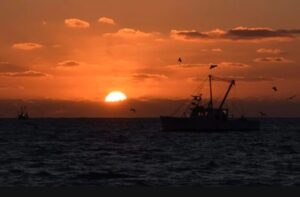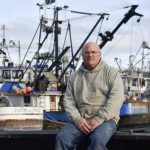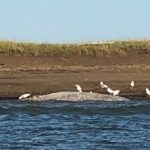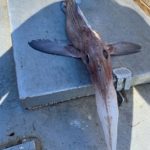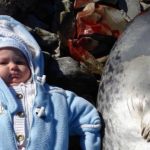Tag Archives: California
Frustrated fishermen get good news: good rockfishing, salmon fishing to return in 2024
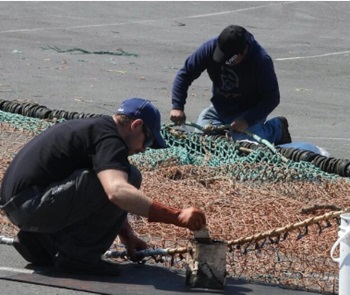 With an oversized head, bulbous eyes and narrow body, the quillback rockfish looks like a golden bullfrog armed with a quiver full of arrows on its back. Few sport fishermen want to keep, much less eat, the famously sharp and ouchy and skinny quillback, which are reeled by those seeking meatier rockfish. But it was the quillback, which is often tossed back into the sea, whose population plummet caused a shutdown that impacted the entire rockfish industry, both for commercial and for party boats operating out of Mendocino Coast’s Noyo Harbor. That mysterious plunge in quillback numbers cut off all near-shore rockfish fishing last year, causing an organized outcry by fishermen and a new plan for 2024. Photos, more, >>click to read<< 07:15
With an oversized head, bulbous eyes and narrow body, the quillback rockfish looks like a golden bullfrog armed with a quiver full of arrows on its back. Few sport fishermen want to keep, much less eat, the famously sharp and ouchy and skinny quillback, which are reeled by those seeking meatier rockfish. But it was the quillback, which is often tossed back into the sea, whose population plummet caused a shutdown that impacted the entire rockfish industry, both for commercial and for party boats operating out of Mendocino Coast’s Noyo Harbor. That mysterious plunge in quillback numbers cut off all near-shore rockfish fishing last year, causing an organized outcry by fishermen and a new plan for 2024. Photos, more, >>click to read<< 07:15
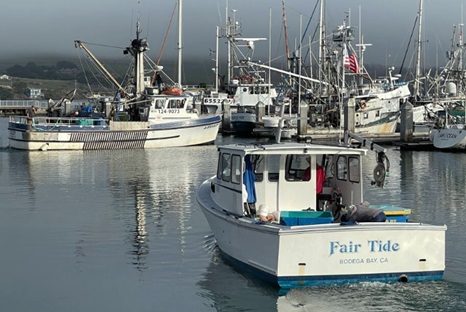
Dungeness crab season gets underway amid hope for relief in commercial fishing fleet
On Sunday, veteran fisherman Chris Lawson learned he had lost his eldest granddaughter in a terrible crash on the Bay Bridge. The next day, he was out on his commercial fishing vessel, Seaward, setting traps on the ocean floor in preparation for the delayed start of the Dungeness crab season Thursday at 12:01 a.m. Moving on is part of the grieving process, said Lawson, a third-generation commercial fisherman. But this year, it also was a necessity. Scarce fishing opportunities over the past year have pushed many in the commercial fishing industry to the brink, so the chance to finally harvest crab, even in the middle of the night, was not to be missed. Lawson’s girlfriend’s son, whom he calls his “stepson,” launched as well, setting pots from a second boat. Video, photos, more, >>click to read<< 08:18
(PHOTOS) Crab On
 As is seemingly never not the case these days, the start of our local commercial Dungeness crab season was again delayed this year. First, it was poor meat quality that prompted the CDFW to push back opening day to Jan. 5. Then, there was another setback: another setback caused by stalled negotiations on this year’s market price for the tasty crustaceans. Crabbing is complicated, people! But that’s all behind us now. On Monday morning Humboldt’s commercial crabbers set out, bright and early, to get their pots in the water. The crab is coming, friends. Local photographer and LoCO pal Matt Filar dragged it out of bed at the crack of Monday’s dawn to document and honor the hard work of our hometown heroic fishermen. We present some of his shots below. >>click to view<< 17:50
As is seemingly never not the case these days, the start of our local commercial Dungeness crab season was again delayed this year. First, it was poor meat quality that prompted the CDFW to push back opening day to Jan. 5. Then, there was another setback: another setback caused by stalled negotiations on this year’s market price for the tasty crustaceans. Crabbing is complicated, people! But that’s all behind us now. On Monday morning Humboldt’s commercial crabbers set out, bright and early, to get their pots in the water. The crab is coming, friends. Local photographer and LoCO pal Matt Filar dragged it out of bed at the crack of Monday’s dawn to document and honor the hard work of our hometown heroic fishermen. We present some of his shots below. >>click to view<< 17:50
Fishermen are gearing up for the Dungeness crab season to start next week
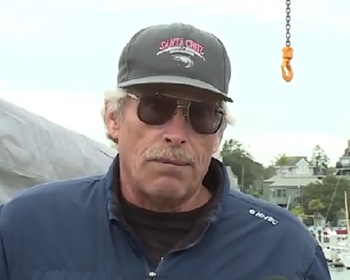 After months of delays, local fishermen will finally be allowed to fish for Dungeness crab off of the Central Coast. The California Department of Fish and Wildlife announced the season will reopen on Jan. 18; however, fleets will only be allowed to use 50 percent of their traps. Meanwhile, those in the industry say the delays and restrictions are frustrating. “The last five years, we’ve been losing all our holiday markets. That means we have to go out in rougher weather,” said Chris Zajac, a Santa Cruz Dungeness crab fisherman. “We only get a month and a half to fish, whereas we used to get eight months to fish for crab,” Zajac said. Video, >>click to read<< 11:24
After months of delays, local fishermen will finally be allowed to fish for Dungeness crab off of the Central Coast. The California Department of Fish and Wildlife announced the season will reopen on Jan. 18; however, fleets will only be allowed to use 50 percent of their traps. Meanwhile, those in the industry say the delays and restrictions are frustrating. “The last five years, we’ve been losing all our holiday markets. That means we have to go out in rougher weather,” said Chris Zajac, a Santa Cruz Dungeness crab fisherman. “We only get a month and a half to fish, whereas we used to get eight months to fish for crab,” Zajac said. Video, >>click to read<< 11:24
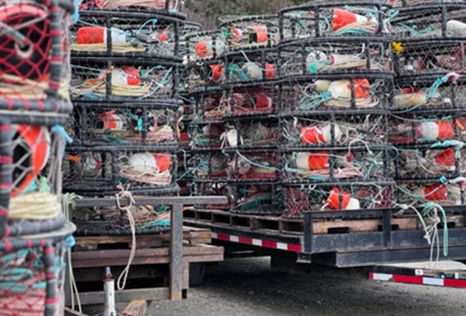
Crab Fishermen on Strike
Commercial Dungeness crab season is allowed locally as of midnight on January 5th. However, we are seeing no crab gear in the water. Local Dungeness crab fishermen are holding out for better pay after they say they’ve been offered an unacceptable amount per pound. The buyers are not offering a price that we’re okay with,” says Jake McMaster, Captain of the Fishing Vessel Captain Banjo. “They offered $3. We countered with $3.50 on the 1st of January, and we have not had a response to that price negotiation.” McMasters says they were getting this price over a decade ago, “$3 a pound– 2012, 2013, ten years ago. Meanwhile, Dungeness crab fishermen in Oregon are getting more than $3 a pound for their crabs. more, >>click to read<< 06:46
Area north of Cape Falcon opens Feb.1 to commercial Dungeness crab fishing
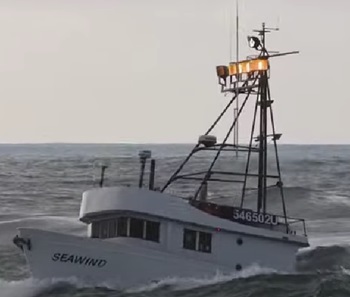 Commercial Dungeness crab fishing from Cape Falcon to Klipsan Beach, Washington begins Feb. 1. A fourth round of pre-season testing shows male crabs in this area were not quite ready for a January opening. The additional time will allow crab to continue to fill with meat before harvest. Targeted to open Dec. 1, Oregon’s ocean commercial Dungeness crab season can be delayed or partially opened so consumers get a high-quality product and crabs are not wasted. This year’s season was partially opened (Cape Foulweather to the California border) Dec. 16 after a delay due to low meat yield in areas north of Cape Foulweather. Once meat yield met criteria, commercial crabbing began Dec. 31 from Cape Foulweather to Cape Falcon. Video, more, >>click to read<< 13:22
Commercial Dungeness crab fishing from Cape Falcon to Klipsan Beach, Washington begins Feb. 1. A fourth round of pre-season testing shows male crabs in this area were not quite ready for a January opening. The additional time will allow crab to continue to fill with meat before harvest. Targeted to open Dec. 1, Oregon’s ocean commercial Dungeness crab season can be delayed or partially opened so consumers get a high-quality product and crabs are not wasted. This year’s season was partially opened (Cape Foulweather to the California border) Dec. 16 after a delay due to low meat yield in areas north of Cape Foulweather. Once meat yield met criteria, commercial crabbing began Dec. 31 from Cape Foulweather to Cape Falcon. Video, more, >>click to read<< 13:22
Humboldt crabbers on strike
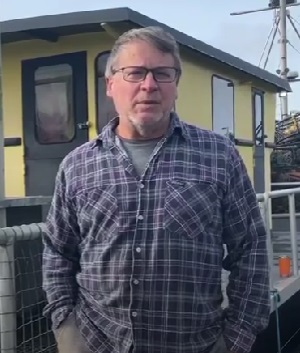 Kevin Pinto, a local fisherman who owns Jenna Lee’s Seafood on Woodley Island in Eureka, Calif., says the companies that purchase crab from the North Coast decided to pay a price that is lower than the fishermen would like. “They offered us a lower price down here—with stipulations it could go lower—and we decided that it probably wasn’t a good idea to fish for that,” Pinto said. The Pacific Seafood Company is one of Humboldt County’s fishermen’s buyers. Fishermen like Pinto are currently withholding their catch, hoping the companies who purchase from them will raise their price per pound of crab. Video, >>click to read<< 08:48
Kevin Pinto, a local fisherman who owns Jenna Lee’s Seafood on Woodley Island in Eureka, Calif., says the companies that purchase crab from the North Coast decided to pay a price that is lower than the fishermen would like. “They offered us a lower price down here—with stipulations it could go lower—and we decided that it probably wasn’t a good idea to fish for that,” Pinto said. The Pacific Seafood Company is one of Humboldt County’s fishermen’s buyers. Fishermen like Pinto are currently withholding their catch, hoping the companies who purchase from them will raise their price per pound of crab. Video, >>click to read<< 08:48
3rd Delay. Commercial crab season delayed again as fishermen seek better compensation
Commercial Dungeness crab season was set to open locally on Friday, but it appears the start date may be pushed back yet again. On Wednesday, the Eureka crab shack Jenna Lee’s Seafood announced they were going on strike along with others in efforts to get a better base price for crabs this season. “The situation with the crab and the weather has changed. Seems the fish companies can’t pay the fisherman a decent price so that they might make a living,” said Jenna Lee’s Seafood in a social media post Wednesday morning, “So we are on strike with all the others to help support a base price. Also the weather is marginal at best. We just can’t even guess at this time what will happen but feel it may not last long.” A longtime Humboldt County fisherman who asked to be quoted off the record said that the issue stems from the offer from the seafood company ‘Pacific Seafood’ per-pound of crab. Video, more, >>click to read<< 13:59
Dungeness Crab season begins January 5
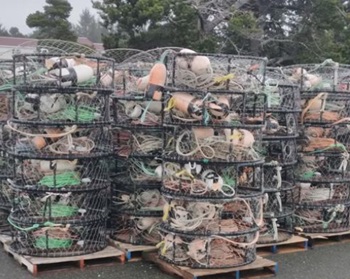 The commercial Dungeness crab season commences in Del Norte County, this week. The California Department of Fish and Wildlife (DFWD) announced the Dungeness season is now open in zones 1 and 2, Sonoma County line to the Oregon border. The delay in zones 3-6, South of the Sonoma / Mendocino will continue to be restricted. Multiple delays in opening the Crab season have been attributed to excessive humpback whale entanglements and the high number of whale sightings, according to the DFWD Assessment and Mitigation program. more, >>click to read<< 17:25
The commercial Dungeness crab season commences in Del Norte County, this week. The California Department of Fish and Wildlife (DFWD) announced the Dungeness season is now open in zones 1 and 2, Sonoma County line to the Oregon border. The delay in zones 3-6, South of the Sonoma / Mendocino will continue to be restricted. Multiple delays in opening the Crab season have been attributed to excessive humpback whale entanglements and the high number of whale sightings, according to the DFWD Assessment and Mitigation program. more, >>click to read<< 17:25
Dungennes crab fishery held up again by recent whale and turtle entanglements
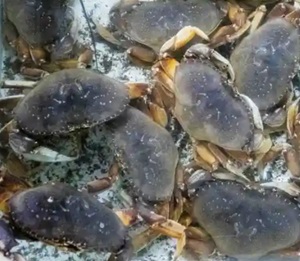 Before the restrictions, the crab fishing season off California started before Thanksgiving, in plenty of time for holiday tables. In recent years, fishermen’s ability to drop their gear has been pushed back because whales and turtles were still be spotted in their fishing zones. This season, fishermen can start dropping their crab pots on Jan. 5, and only in the two most northern California zones. In central and southern California no start date has been announced. Officials with the Pacific Coast Federation of Fishermen’s Associations said the industry does its best to avoid whales and have accepted limiting the seasons, but notes that since the restrictions have been in place, the industry has dropped from 450 active vessels to fewer than 100 and has lost out on tens of millions of dollars. more, >>click to read<< 07:47
Before the restrictions, the crab fishing season off California started before Thanksgiving, in plenty of time for holiday tables. In recent years, fishermen’s ability to drop their gear has been pushed back because whales and turtles were still be spotted in their fishing zones. This season, fishermen can start dropping their crab pots on Jan. 5, and only in the two most northern California zones. In central and southern California no start date has been announced. Officials with the Pacific Coast Federation of Fishermen’s Associations said the industry does its best to avoid whales and have accepted limiting the seasons, but notes that since the restrictions have been in place, the industry has dropped from 450 active vessels to fewer than 100 and has lost out on tens of millions of dollars. more, >>click to read<< 07:47
CDFW Opens Commercial Dungeness Crab Fishery in Northern Management Zone, Continues Commercial Fishery Delay in Central Management Area.
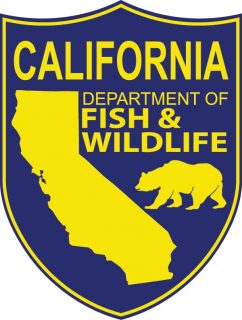 The California Department of Fish and Wildlife (CDFW) will open the commercial Dungeness crab fishery from the Oregon state line to the Sonoma/Mendocino county line (Fishing Zones 1 and 2) under a Fleet Advisory beginning Jan. 5, 2024 at 12:01 a.m. with a 64-hour pre-soak to begin on Jan. 2, 2024 at 8:01 a.m. The commercial fishery will remain delayed from the Sonoma/Mendocino county line to the U.S./Mexico border (Fishing Zones 3, 4, 5 and 6) until at least the next risk assessment due to elevated numbers of humpback whales resulting in increased entanglement risk. CDFW is also continuing the temporary recreational crab trap restriction from the Sonoma/Mendocino county line to Lopez Point, Monterey County, more, >>click to read<< 17:29
The California Department of Fish and Wildlife (CDFW) will open the commercial Dungeness crab fishery from the Oregon state line to the Sonoma/Mendocino county line (Fishing Zones 1 and 2) under a Fleet Advisory beginning Jan. 5, 2024 at 12:01 a.m. with a 64-hour pre-soak to begin on Jan. 2, 2024 at 8:01 a.m. The commercial fishery will remain delayed from the Sonoma/Mendocino county line to the U.S./Mexico border (Fishing Zones 3, 4, 5 and 6) until at least the next risk assessment due to elevated numbers of humpback whales resulting in increased entanglement risk. CDFW is also continuing the temporary recreational crab trap restriction from the Sonoma/Mendocino county line to Lopez Point, Monterey County, more, >>click to read<< 17:29
Sonoma County snags disaster relief designation for salmon fishery devastation
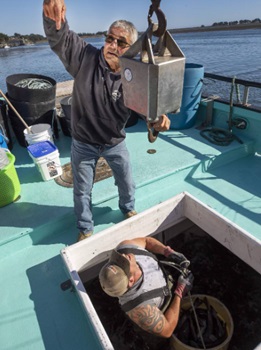 “Small businesses in Sonoma County that rely on salmon fishing for their livelihood were devastated when the fishery was shut down,” said county Supervisor Lynda Hopkins, whose district encompasses the Sonoma Coast. Hopkins added the business loans are intended “to help them recover. The SBA also lists other, bordering counties, with the presumption that those “may have suffered economic injury as well.” These include Napa, Marin, Solano, Mendocino and Lake. “We have lost 80% of our fleets in the last 40 years,” said Glen Spain, executive director of the Pacific Coast Federation of Fishermen’s Associations, which manages about a dozen fishing groups. He defined California’s $45 million fishing industry as being especially hard hit with state Fish and Wildlife’s permits dropping from 7,744 in 1980 to 1,006 this year. “These loans are trying to keep people intact as much as possible,” Spain said. photos, more, >>click to read<< 14:38
“Small businesses in Sonoma County that rely on salmon fishing for their livelihood were devastated when the fishery was shut down,” said county Supervisor Lynda Hopkins, whose district encompasses the Sonoma Coast. Hopkins added the business loans are intended “to help them recover. The SBA also lists other, bordering counties, with the presumption that those “may have suffered economic injury as well.” These include Napa, Marin, Solano, Mendocino and Lake. “We have lost 80% of our fleets in the last 40 years,” said Glen Spain, executive director of the Pacific Coast Federation of Fishermen’s Associations, which manages about a dozen fishing groups. He defined California’s $45 million fishing industry as being especially hard hit with state Fish and Wildlife’s permits dropping from 7,744 in 1980 to 1,006 this year. “These loans are trying to keep people intact as much as possible,” Spain said. photos, more, >>click to read<< 14:38
California’s Central Valley Chinook Are Getting Lost on Their Way Home
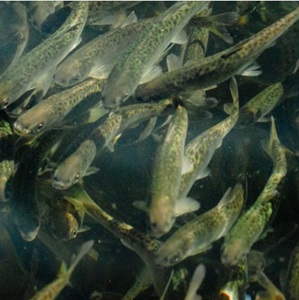 Picture yourself: a chinook salmon in the prime of your life. You dart through the water off California’s central coast, winding through kelp and dodging hungry sea lions. Long, sleek and silver, dappled with dark spots. Eyes wide and vigilant. More than 20 kilograms of pure muscle. You’ve been out at sea for several years now, first voyaging north along the Oregon coastline, then westward into deeper water. As winter approaches and the days grow shorter, you’ve found your way back to California. You’ve felt the seasons turn before, but this year, it means something special. Your kind, the Central Valley chinook—what fishers call the king salmon—are not born at sea. For thousands of years, your ancestors began their lives in the heart of California, where tributaries and streams flow together to form the mighty Sacramento and San Joaquin Rivers. photos, >>click to read<< 08:31
Picture yourself: a chinook salmon in the prime of your life. You dart through the water off California’s central coast, winding through kelp and dodging hungry sea lions. Long, sleek and silver, dappled with dark spots. Eyes wide and vigilant. More than 20 kilograms of pure muscle. You’ve been out at sea for several years now, first voyaging north along the Oregon coastline, then westward into deeper water. As winter approaches and the days grow shorter, you’ve found your way back to California. You’ve felt the seasons turn before, but this year, it means something special. Your kind, the Central Valley chinook—what fishers call the king salmon—are not born at sea. For thousands of years, your ancestors began their lives in the heart of California, where tributaries and streams flow together to form the mighty Sacramento and San Joaquin Rivers. photos, >>click to read<< 08:31
California Dungeness crab season on hold again, fishermen losing out big
Dungeness crab season is on hold again. There are a lot fewer fishing boats at Pillar Point Harbor in Half Moon Bay these days. A high number of migrating humpback whales and a recently confirmed leatherback sea turtle, the largest turtle in the world, being caught in Dungeness crab fishing gear, according to the California Department of Fish and Wildlife, has caused the state to prevent crab traps from being used once again. “Absolutely criminal ’cause they’re not solving the problem by keeping us tied to the dock,” Matthew Paul, who has been crabbing along the California coast for four decades.”That’s about six bucks to the public,” Rick Hauschel explained the price of a crab held in his hands, after lifting one out of a tank on his boat, the Polaris. Video, photos, >>click to read<< 06:59
Where will the whales be? Ask the climate model
In a new study, scientists say they can now use global temperature models, commonly used in climate science, to predict up to a year in advance when hot ocean temperatures will raise the risk of whale entanglements. This lead time could allow state regulators, fishers and other businesses that depend on the fishery, as well as Californians hoping for a Dungeness crab holiday meal, to plan ahead for potential fishing restrictions. Ecological forecasts could help New England and maritime Canada, where highly endangered right whales are also getting entangled in fishing gear. “My personal opinion is that this is very, very helpful,” said Richard Ogg, a commercial fishing boat captain based in Bodega Bay. more, >>click to read<< 11:57
California’s commercial Dungeness crab season delayed yet again
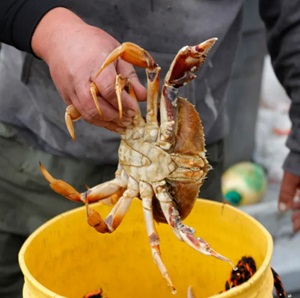 California’s commercial Dungeness crab season has once again been delayed, officials from the California Department of Fish and Wildlife announced. Delays in the crabbing season have been implemented to protect humpback whales and leatherback sea turtles, protected species that are sometimes entangled in crabbing lines and gear. Years of repeated delays and the cancellation of this year’s salmon season have hurt Santa Cruz fishermen financially, says Tim Obert, local commercial fisherman and president of the Santa Cruz Commercial Fishermen’s Association. “This year’s crab season is going to be some of the first income for these boats since last year’s crab season closed,” said Obert, noting that he has economically relied on the black cod fishery this year, instead of the usual salmon and Dungeness crab mainstays. more, >>click to read<< 13:54
California’s commercial Dungeness crab season has once again been delayed, officials from the California Department of Fish and Wildlife announced. Delays in the crabbing season have been implemented to protect humpback whales and leatherback sea turtles, protected species that are sometimes entangled in crabbing lines and gear. Years of repeated delays and the cancellation of this year’s salmon season have hurt Santa Cruz fishermen financially, says Tim Obert, local commercial fisherman and president of the Santa Cruz Commercial Fishermen’s Association. “This year’s crab season is going to be some of the first income for these boats since last year’s crab season closed,” said Obert, noting that he has economically relied on the black cod fishery this year, instead of the usual salmon and Dungeness crab mainstays. more, >>click to read<< 13:54
Bay Area business hauling in, washing boats for free as fishing industry struggles
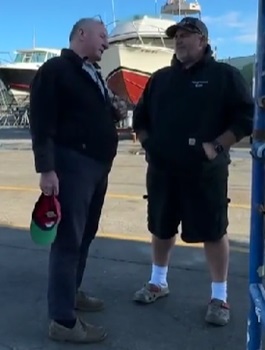 Local fishermen are getting a helping hand as they eagerly wait for the commercial Dungeness crab season. They didn’t get to fish salmon this year, and the presence of Humpback whales is delaying the crab season, causing them financial hardship. To help them, Paul Kaplan, for the first time since establishing Keefe Kaplan Maritime decades ago, is offering all Northern California fisherman hauling-in and power washing services free of charge. “They’re a vital part of our industry and supporting our craftsmen, and so I thought it was the right thing to do,” said Kaplan. Delayed starts and shortened seasons for crab fisherman have taken a toll on the livelihood of small businesses. “It’s becoming for most of us maxed credit cards and hoping that we get to go crabbing soon enough before they’re due. Everybody in the fleet is hurting,” said Brand Little. Video, more, >>click to read<< 13:11
Local fishermen are getting a helping hand as they eagerly wait for the commercial Dungeness crab season. They didn’t get to fish salmon this year, and the presence of Humpback whales is delaying the crab season, causing them financial hardship. To help them, Paul Kaplan, for the first time since establishing Keefe Kaplan Maritime decades ago, is offering all Northern California fisherman hauling-in and power washing services free of charge. “They’re a vital part of our industry and supporting our craftsmen, and so I thought it was the right thing to do,” said Kaplan. Delayed starts and shortened seasons for crab fisherman have taken a toll on the livelihood of small businesses. “It’s becoming for most of us maxed credit cards and hoping that we get to go crabbing soon enough before they’re due. Everybody in the fleet is hurting,” said Brand Little. Video, more, >>click to read<< 13:11
Feds offer emergency loans to idled salmon industry
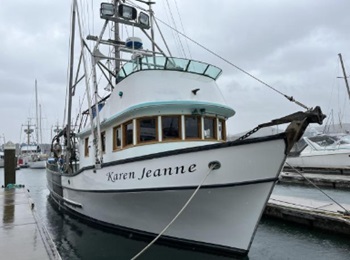 Last spring, the commercial chinook salmon season was completely cancelled. Now federal officials are offering emergency subsidized loans for an industry in crisis. The loans must be repaid over a 30-year term, though no payments are required over the first year. George Kostyrko, a spokesman for the federal Small Business Administration, or SBA, said the aid is meant to help a now struggling sector. “The closure has had an economic impact on the commercial and recreational fishing and those associated with the broader salmon fishing industry here on the west coast,” Kostyrko said. more, >>lick to read<< 06:50
Last spring, the commercial chinook salmon season was completely cancelled. Now federal officials are offering emergency subsidized loans for an industry in crisis. The loans must be repaid over a 30-year term, though no payments are required over the first year. George Kostyrko, a spokesman for the federal Small Business Administration, or SBA, said the aid is meant to help a now struggling sector. “The closure has had an economic impact on the commercial and recreational fishing and those associated with the broader salmon fishing industry here on the west coast,” Kostyrko said. more, >>lick to read<< 06:50
Blue power: Will ocean waves be California’s new source of clean energy?
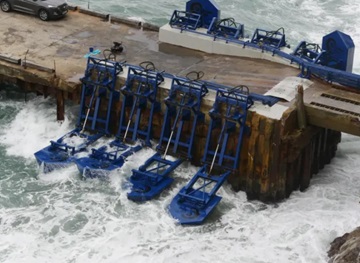 The world’s oceans may be vast, but they are getting crowded. Coastal areas are congested with cargo ships, international commercial fishing fleets, naval vessels, oil rigs and, soon, floating platforms for deep-sea mining. But the Pacific Ocean is going to get even busier: Nearly 600 square miles of ocean off California have been leased for floating wind farms, with more expected. Now the state is considering hosting another renewable energy technology in the sea: Blue power, electricity created from waves and tides. A new law signed by Gov. Gavin Newsom in October instructs state agencies to study the feasibility and impacts of capturing ocean movement to create power and report back to the Legislature by January 2025. more , >>click to read<<07:20
The world’s oceans may be vast, but they are getting crowded. Coastal areas are congested with cargo ships, international commercial fishing fleets, naval vessels, oil rigs and, soon, floating platforms for deep-sea mining. But the Pacific Ocean is going to get even busier: Nearly 600 square miles of ocean off California have been leased for floating wind farms, with more expected. Now the state is considering hosting another renewable energy technology in the sea: Blue power, electricity created from waves and tides. A new law signed by Gov. Gavin Newsom in October instructs state agencies to study the feasibility and impacts of capturing ocean movement to create power and report back to the Legislature by January 2025. more , >>click to read<<07:20
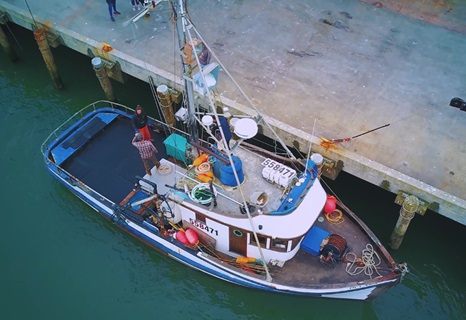
Reopening Areas for Groundfish Fishing After 20 Years
NOAA Fisheries has published regulation changes that will open fishing areas that have been closed for over 20 years. These areas were originally closed in the early 2000s to protect several species of overfished rockfish. With the rebuilt status of almost all these groundfish species, these closures can slowly be opened and allow fishermen greater access to catch healthy fish stocks. The regulations will also close some small areas to protect groundfish habitat, yelloweye rockfish (a species that is still rebuilding), and sensitive areas with abundant coral. These regulation changes are effective on January 1, 2024. Groundfish on the West Coast encompass over 90 species sharing one important trait: at some point in their life, they live on or near the ocean floor. Groundfish are a crucial part of West Coast underwater environments. They act as both predator and prey to different species and help maintain balance in underwater food chains. photos, charts, info, >>click to read<< 11:10
Equinor Names California Floating Wind Project
 Equinor has announced the name of its floating offshore wind project off the coast of California, Atlas Wind. The lease area, which lies 60 miles from Morro Bay, has the capacity to provide over 2GW of reliable, renewable power, enough to power 1.7 million California homes once complete. California is poised to become a growing force in the US energy transition with a nation-leading target of 25GW of offshore wind energy by 2045. Approximately two-thirds of the United States’ offshore wind energy potential lies in deep coastal waters, like the Pacific Ocean, where water depths reach 1,000 meters (3,280 feet) or more. more, >>click to read<< 11:36
Equinor has announced the name of its floating offshore wind project off the coast of California, Atlas Wind. The lease area, which lies 60 miles from Morro Bay, has the capacity to provide over 2GW of reliable, renewable power, enough to power 1.7 million California homes once complete. California is poised to become a growing force in the US energy transition with a nation-leading target of 25GW of offshore wind energy by 2045. Approximately two-thirds of the United States’ offshore wind energy potential lies in deep coastal waters, like the Pacific Ocean, where water depths reach 1,000 meters (3,280 feet) or more. more, >>click to read<< 11:36
Commercial Dungeness crab season delayed
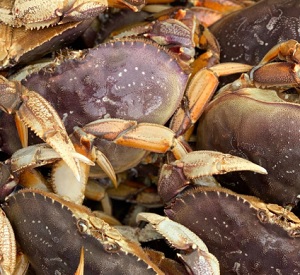 Pre-season testing shows Dungeness crabs are too low in meat yield in some ocean areas, delaying Oregon’s commercial season until at least Dec. 16. Targeted to open Dec. 1, Oregon’s ocean commercial Dungeness crab season can be delayed so consumers get a high-quality product, and crabs are not wasted. The next round of crab meat yield and biotoxin testing will occur in the coming weeks. Results help determine if the season opens Dec. 16 or is further delayed or split into areas with different opening dates. Oregon, California and Washington coordinate Dungeness crab quality testing and the commercial season opening dates. >>click to read<< 14:30
Pre-season testing shows Dungeness crabs are too low in meat yield in some ocean areas, delaying Oregon’s commercial season until at least Dec. 16. Targeted to open Dec. 1, Oregon’s ocean commercial Dungeness crab season can be delayed so consumers get a high-quality product, and crabs are not wasted. The next round of crab meat yield and biotoxin testing will occur in the coming weeks. Results help determine if the season opens Dec. 16 or is further delayed or split into areas with different opening dates. Oregon, California and Washington coordinate Dungeness crab quality testing and the commercial season opening dates. >>click to read<< 14:30
Dungeness Crab Season Delayed Again, This Time Until Mid-December
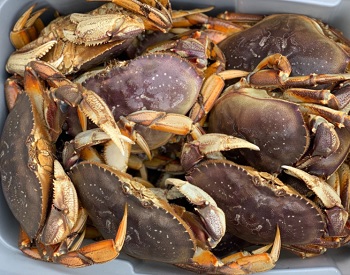 The Commercial Dungeness crab fishing season has been delayed again, this time due partly to poor meat quality found in samples, and due to humpback whales still migrating south. While hopes for Thanksgiving crab were already dashed a few weeks ago with the initial delay, a second delay in California’s commercial Dungeness crab fishing season has been called by the state fish and wildlife authorities. In a Friday announcement, the California Department of Fish and Wildlife said that they would reevaluate the fishery on December 7 for a potential opening of the commercial season on December 16. >>click to read<< 12:07
The Commercial Dungeness crab fishing season has been delayed again, this time due partly to poor meat quality found in samples, and due to humpback whales still migrating south. While hopes for Thanksgiving crab were already dashed a few weeks ago with the initial delay, a second delay in California’s commercial Dungeness crab fishing season has been called by the state fish and wildlife authorities. In a Friday announcement, the California Department of Fish and Wildlife said that they would reevaluate the fishery on December 7 for a potential opening of the commercial season on December 16. >>click to read<< 12:07
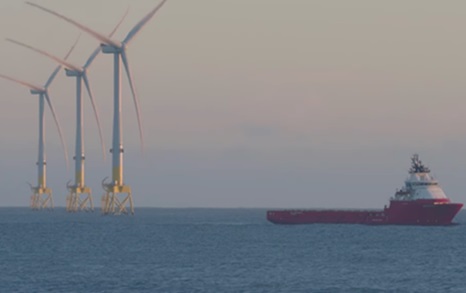
Ringside View: Offshore Wind is a Financial and Environmental Catastrophe
It’s about time Californians of all ideological persuasions wake up and stop what is possibly the most economically wasteful and environmentally destructive project in American history: the utility scale adoption of offshore wind energy. The California Legislature intends to despoil our coastline and coastal waters with floating wind turbines, 20+ miles offshore, tethered to the sea floor 4,000 feet beneath the waves. Along with tethering cables, high voltage wires will descend from each of these noisy, 1,000 foot tall leviathans, but we’re to assume none of this will disrupt the migrations of our treasured Cetaceans and other marine and avian life, not the electric fields emanating from hundreds (thousands?) of 20+ mile long live power lines laid onto the ocean floor, nor from the construction, the maintenance, or the new ports, ships, and submersibles. >>click to reafd<< 10:57
Salmon fall run in Mokelumne River sets 80-year record
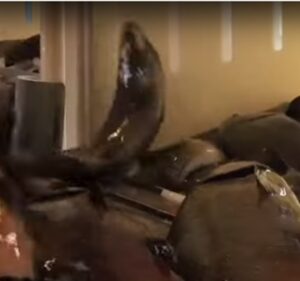 More fall-run Chinook salmon are returning to spawn in the Mokelumne River this year than in any year since 1940, when wildlife officials first began tracking the population, according to the East Bay Municipal Utility District. EBMUD officials announced Thursday that more than 20,000 fish have so far returned to the river to complete their life cycle. “This year’s historic return highlights EBMUD’s longstanding collaboration in the region and our deep commitment to sustaining this vital fish hatchery and protecting the river’s habitat,” said EBMUD board president Andy Katz. Video, >>click to read<< 09:36
More fall-run Chinook salmon are returning to spawn in the Mokelumne River this year than in any year since 1940, when wildlife officials first began tracking the population, according to the East Bay Municipal Utility District. EBMUD officials announced Thursday that more than 20,000 fish have so far returned to the river to complete their life cycle. “This year’s historic return highlights EBMUD’s longstanding collaboration in the region and our deep commitment to sustaining this vital fish hatchery and protecting the river’s habitat,” said EBMUD board president Andy Katz. Video, >>click to read<< 09:36
Commercial Dungeness crab season delayed by California Fish and Wildlife
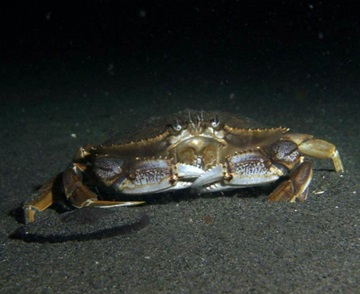 The California Department of Fish and Wildlife on Friday delayed the opening of the commercial Dungeness crab season, citing the need to protect humpback whales and other ocean life from entanglement. The delay — which will remain in effect until further notice — affects the taking and possession of commercially-caught Dungeness crab for 200 nautical miles extending from the California coastline. Additionally, a fleet advisory is in effect for recreational Dungeness crab, reminding fisheries to maintain best practices. The next risk assessment is scheduled for around Dec. 7. Friday’s decision falls on the heels of a late October call by the department to restrict recreational and commercial crab fishing in the state. >>click to read<< 09:01
The California Department of Fish and Wildlife on Friday delayed the opening of the commercial Dungeness crab season, citing the need to protect humpback whales and other ocean life from entanglement. The delay — which will remain in effect until further notice — affects the taking and possession of commercially-caught Dungeness crab for 200 nautical miles extending from the California coastline. Additionally, a fleet advisory is in effect for recreational Dungeness crab, reminding fisheries to maintain best practices. The next risk assessment is scheduled for around Dec. 7. Friday’s decision falls on the heels of a late October call by the department to restrict recreational and commercial crab fishing in the state. >>click to read<< 09:01








